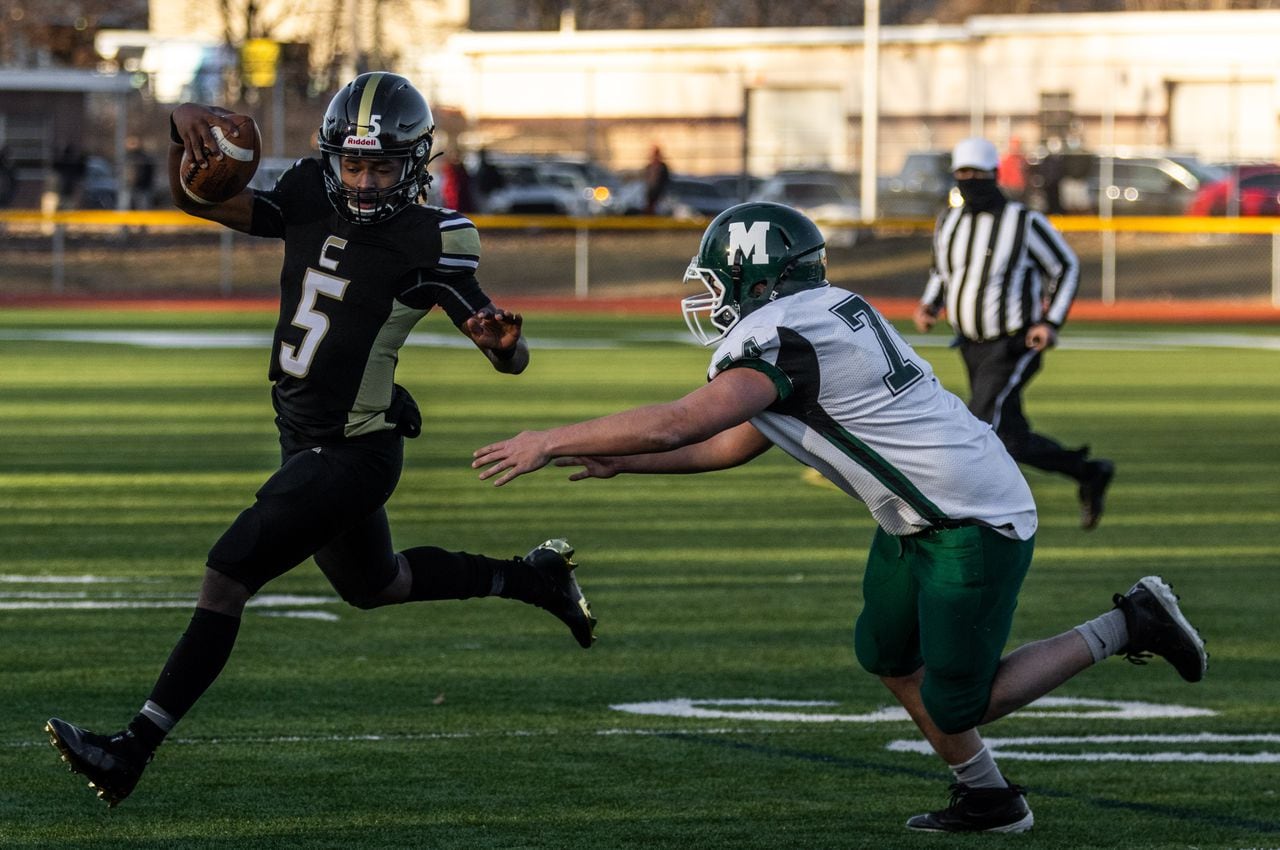
Note: This is the second in a two-part series looking at the AA League, Springfield Central’s place in that league and how local teams react to playing the Golden Eagles each season. Read Part I here.
Over the last decade, Western Massachusetts high school football coaches and players have watched Springfield Central’s climb from being the best program in the city, to the best in the region and the state.
The last time the Golden Eagles lost to an opponent from Western Massachusetts was in 2016 against Westfield. Since then, Springfield Central has gone 42-0 against local opponents, outscored teams in the region 2,080-204, won three state titles and sent over half a dozen of its players to Division I college football programs.
Because of Springfield Central’s success, other teams in the region have been pushed to take offseason training more seriously. Some programs have started to schedule more non-league games outside of Western Massachusetts, much like the Golden Eagles.
Springfield Central is the largest high school in Western Massachusetts and is the only Division I football school in the region. The team competes in the AA League with Holyoke, Chicopee Comp, Minnechaug, Longmeadow and Westfield; all Division III and IV programs.
The Golden Eagles have held the torch high for Western Massachusetts in the last decade, and local coaches have been inspired by what the program has done. Almost a decade into the program’s dominant run, though, some teams in Western Mass. feel like the Golden Eagles have ascended to a level of play that they can’t keep up with — and one that puts their players’ health at risk.
“The coaching staff at Central has done an amazing job,” Holyoke coach David Guzman said. “Those kids deserve every accolade that they’ve gotten. I don’t want to take anything away from those kids. … But in terms of talent, there’s a huge discrepancy. … Going into Central week, pretty much just like every other week, I’m trying to win. I’m trying to gain an advantage. I’m not going in there trying to lose the game. But at the end of the day, I find myself year after year worrying about the safety of my kids more than winning the game.”
Westfield coach Rob Parent has been inspired by the Golden Eagles’ rise in recent years and is proud of how the team has represented the region at the state level, but has also become opposed to playing the program going forward because of safety concerns.
The Golden Eagles have the second-biggest roster in Western Massachusetts, have more varsity-ready players than any other team and can have athletes compete exclusively on one side of the ball. With so much depth, Springfield Central can play better in the second half of games and do more at practice than other team in its league.
The Golden Eagles had 57 players on its roster last fall, while a program like Westfield had, at its highest, 22 varsity players late in the season.
“Nobody has the depth to run with these guys,” Parent said. “We’re two injuries away from being dead in the water. … Central goes two-deep on both sides of the ball, varsity and JV. That’s a different program.”
Parent has brought his competition and safety concerns related to playing Springfield Central to the Pioneer Valley Interscholastic Athletic Conference (PVIAC) and Westfield administrators in the past, but has been told that Springfield Central’s place in the league is ultimately up to the Golden Eagles.
During the week leading up to Westfield’s game against Springfield Central on Oct. 13, the Bombers were dealing with injuries to a handful of starters following the previous week’s game against Longmeadow and were down to 15 full-time varsity players.
Parent, feeling like his concerns about playing the Golden Eagles had gone unheard in recent years, and that he was in a position where his team couldn’t afford any more injuries, wrote a letter addressed to the PVIAC stating that the Bombers were prepared to forfeit that week’s game against Springfield Central.
In the letter, Parent wrote that Westfield had players injured or sick who missed multiple days of practice and would not be available to play, forcing the Bombers to pull up younger athletes who were not equipped to compete in a varsity game against the Golden Eagles.
“We tried to be direct and honest in that letter and just say that this is the predicament we find ourselves in,” Parent said. “Could we have played that game that week against any other opponent? Of course … because every other opponent is in the same situation we are. Central’s a different animal. We were somewhere between 17 and 22 varsity players all year. They have 17 to 22 first-string varsity players on either side of the ball, and so that’s a massive difference. It’s a huge competitive advantage to the numbers that they have. It’s not like you can just roll out a team and say, have at it. That’s what we tried to express in that letter.”
Parent’s primary concern in wanting to forfeit the game was the health and safety of his players, but other factors also played a part in his decision-making process.
Margin of victory is used as an element in the state’s postseason power-ranking formula. In football, the margin of victory cap is 14 points.
For example, if a team defeats its opponent by 14 points or 50 points, the winning team is awarded the same numerical value in the formula. If a team wins by seven points, the win isn’t as valuable in comparison to winning by 14 or more.
When a football team forfeits a game, the loss goes into the stat book as a 14-0 loss.
Parent believed, especially in its diminished state because of injuries, that his team was going to lose that week’s game to Springfield Central by more than 14 points. With that in mind, it was his belief that forfeiting the game, not risking any more injuries, taking a 14-point forfeit loss and getting ready for the following week’s game against Holyoke was the best course of action.
“I’ll go there and take my 14-point loss, or I can stay at home and take my 14-point loss,” Parent said. “Playoff-wise, nothing changed. That’s where I was at with it.
“Even at our best, we’re a four to five score loss to Central. You either can go to that game with a less-than-stellar varsity Westfield team that week, lose by more than 14 and then physically get beat up, or you do the right thing for your team. … It’s a 14-point loss no matter which way you look at it, and we get to keep our guys healthy and ready for the next week. … That was absolutely part of the calculus.”
PVIAC Executive Board Chair Jim Blain responded to Parent’s letter with a statement addressed to Westfield High School Principal Charles Jendrysik.
“Forfeiting a game can have implications for the league as a whole,” Blain said in the statement obtained by MassLive. “It can disrupt the schedule and fairness of the competition, which is something we all strive to maintain.”
MassLive reached out to Blain for more information about the letter to Westfield, but did not receive a response.
Blain also laid out the penalties that the Westfield football program would receive if it decided not to play the game.
Penalties included a recommendation from the PVIAC to the state athletic association to not allow Westfield to compete in the Division III state postseason. If that recommendation were to be denied, the PVIAC would secondarily recommend to the MIAA that Westfield not receive the point values of playing Springfield Central, that Westfield be removed from the AA League and be required to play an independent schedule.
Following the response from Blain and the PVIAC, Westfield reversed course, elevated younger players into starting roles and decided to play the game. Springfield Central went on to win, 44-7, giving the Bombers its only regular-season loss of the fall.
Westfield went on to qualify for the Div. III state postseason and fell in the state semifinals to eventual champion Milton.
The lengths that Parent and the Bombers were prepared to go to not play the Golden Eagles demonstrated just how in need some programs in the AA League are for something to change.
“Every year teams go in there, play hard, do their best, but nobody ever walks out of that game (against Springfield Central) the same. That’s an issue,” Parent said. “From a week-to-week standpoint, some people believe that playing (Springfield Central) makes you better. I don’t believe in that for some of our teams (in the league). I don’t think it makes any of them better. I just think we have to have eyes on a bigger prize, and that’s trying to get more Western Mass. representation at the highest levels. And if we’re going to kind of send ourselves into a brick wall every week, I don’t think we’re doing ourselves any service.”
Minnechaug coach Will Nickerson is one of the few coaches in the AA League who feels like playing Springfield Central makes his team better.
During the coronavirus-shortened 2021 spring season, the Falcons scheduled two games against Springfield Central. The Golden Eagles won both games, 55-14 and 39-17.
Nickerson knows that college football recruiters have become regulars at Springfield Central games in recent years. Nickerson wants his players to have the opportunity to play high-level college football, and he thinks one of the best ways to give his players the spotlight is by playing the Golden Eagles.
Unlike Westfield, Minnechaug has the roster numbers on paper to match up with Springfield Central.
The Falcons were the only program in Western Massachusetts last fall that had more players on its roster than the Golden Eagles, opening the season with 60 players.
“I want kids to go play college football if they want to play college football, so when you play Central, they have a bunch of kids that will go play college football,” Nickerson said. “I like playing them. Our kids aren’t afraid to play them. We know what we can do and we know there’s gonna be spots where they’re better than us, but that’s any game. Not every kid from Central’s gonna play college football or go Division I or Division II. They have Division III players, too.
“I don’t know how people make it sound like we’re playing the Patriots. They’re high school kids. They make mistakes, and they make great plays, too.”
Longmeadow coach Tanner Williams is also in favor of continuing to play the Golden Eagles because he believes that the challenge of matching up with them makes his team better.
But he also thinks that teams that compete in Division IV like Longmeadow should be rewarded more in the power ranking formula for playing a Division I state power like Springfield Central.
Despite his reservations with the current power-ranking formula, Williams says he would go as far as trying to schedule Springfield Central as a non-league game if the Golden Eagles did eventually leave the AA League because of how much he values the competition.
“We should play Central every year,” Williams said. “If they eventually go and join a Central Mass. league … I’d be calling up (Springfield Central coach) Bill Watson and saying, ‘Hey, what are you doing Week 1?’ … I don’t know if he’d give it to me, but I’d want to play them because we want to play good teams to get better, and I think that’s the way that the tournament committee should look at it.”






